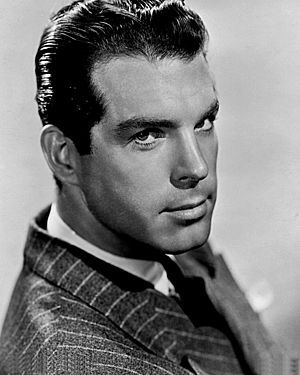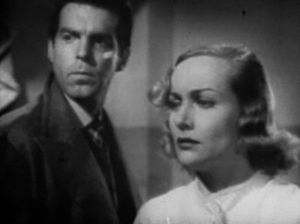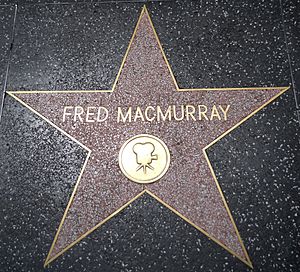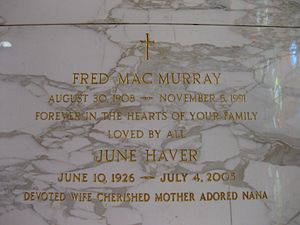Fred MacMurray facts for kids
Quick facts for kids
Fred MacMurray
|
|
|---|---|

MacMurray in the 1930s
|
|
| Born |
Frederick Martin MacMurray
August 30, 1908 Kankakee, Illinois, U.S.
|
| Died | November 5, 1991 (aged 83) Santa Monica, California, U.S.
|
| Occupation | Actor |
| Years active | 1929–1978 |
| Political party | Republican |
| Spouse(s) |
Lillian Lamont
(m. 1936; died 1953)June Haver
(m. 1954) |
| Children | 4 |
| Relatives | Fay Holderness (aunt) |
Frederick Martin MacMurray (born August 30, 1908 – died November 5, 1991) was a famous American actor. He starred in over one hundred movies and a very popular TV show. His acting career lasted for almost 50 years!
Fred MacMurray became a major movie star in 1935. One of his most well-known roles was in the movie Double Indemnity. From 1959 to 1973, he appeared in many beloved Disney films. These included The Shaggy Dog, The Absent-Minded Professor, and Follow Me, Boys!. He also played Steve Douglas in the long-running TV series My Three Sons.
Fred MacMurray: A Star for All Ages
Early Life and Education
Frederick Martin MacMurray was born on August 30, 1908, in Kankakee, Illinois. His parents were Maleta and Frederick Talmadge MacMurray. His father was a talented concert violinist. Fred's aunt, Fay Holderness, was also a performer in vaudeville shows and movies.
When Fred was a baby, his family moved to Madison, Wisconsin. His father taught music there. Later, they moved to Beaver Dam, which was his mother's hometown. Fred went to school in Quincy, Illinois. He then earned a full scholarship to Carroll College in Waukesha, Wisconsin. While in college, he played the saxophone in many local bands. He did not finish college, but he was ready for a career in entertainment!
His Amazing Acting Career

Before becoming a movie star, Fred MacMurray was a singer. He recorded songs with famous orchestras in the 1930s. He also performed on Broadway, which is New York City's famous theater district. He was in shows like Three's a Crowd and Roberta.
In the 1930s, Fred started working in Hollywood. He acted with many big stars like Barbara Stanwyck, Henry Fonda, and Humphrey Bogart. He made seven films with Claudette Colbert, starting with The Gilded Lily. He also co-starred with Katharine Hepburn in Alice Adams and Joan Crawford in Above Suspicion. He made four movies with Carole Lombard, including Swing High, Swing Low.
Fred was often cast as a kind and thoughtful character in comedies and musicals. He became one of the highest-paid actors in Hollywood. In 1943, he earned $420,000 a year. This made him the highest-paid actor and the fourth-highest-paid person in the entire country!
Playing Different Kinds of Characters
Even though he was known as a "nice guy," Fred often said his favorite roles were when he played characters who were not so nice. One of his most famous "bad guy" roles was Walter Neff in the movie Double Indemnity. In this film, he played an insurance salesman who plans a crime with a greedy wife.
He also played Lieutenant Thomas Keefer in The Caine Mutiny. Six years later, he was Jeff Sheldrake in the Oscar-winning movie The Apartment. In this film, he played a corporate executive who was not a very good person.
In 1959, Fred's career took off even more when he starred as the father in the Disney film The Shaggy Dog.
Television Success with My Three Sons
From 1960 to 1972, Fred MacMurray starred in My Three Sons. This TV show was very popular and ran for a long time. While doing the show, he also made other movies. He played Professor Ned Brainard in The Absent-Minded Professor and its sequel Son of Flubber.
Fred was a smart businessman. His contract for My Three Sons allowed him to film all his scenes in just two short periods each year. This gave him more time to make movies, manage his ranch in Northern California, and play golf. Fred became one of the wealthiest actors because of his smart investments and careful spending. After his last movie, The Swarm, in 1978, he appeared in commercials for Greyhound Lines and a math program called chisenbop.
Personal Life and Family

Fred MacMurray was married two times. His first wife was Lillian Lamont. They married in 1936 and adopted two children, Susan and Robert. After Lillian passed away in 1953, Fred married actress June Haver in 1954. They adopted two more children, twin girls named Katherine and Laurie, in 1956. Fred and June's marriage lasted for 37 years, until his death.
Fred was also a successful businessman. In 1941, he bought a large piece of land in Northern California. He called it MacMurray Ranch. On his 1,750-acre ranch, he raised award-winning cattle and grew crops like prunes and apples. He also enjoyed painting, fishing, and skeet shooting. Fred wanted the ranch's farming history to be kept alive. So, after he died, the ranch was sold to a winery. Today, the winery makes wines under the "MacMurray Ranch" name. Fred's daughter, Kate MacMurray, lives on the ranch and helps with the wine business.
Health and Passing
Fred MacMurray was a heavy smoker throughout his life. He had throat cancer in the late 1970s, and it returned in 1987. In December 1988, he had a serious stroke that affected his right side and his speech. With therapy, he recovered quite a bit. After battling leukemia for over ten years, Fred MacMurray passed away from pneumonia on November 5, 1991, in Santa Monica, California.
Awards and Special Recognition
In 1939, artist C. C. Beck used Fred MacMurray as the first model for the superhero character who became Fawcett Comics' Captain Marvel. Fred was nominated for a Golden Globe Award for Best Actor – Motion Picture Musical and Comedy for his role in The Absent-Minded Professor. In 1987, he was the very first person to be honored as a Disney Legend. This award celebrates people who have made important contributions to The Walt Disney Company.
Filmography
Film Roles
| Year | Title | Role |
|---|---|---|
| 1929 | Why Leave Home? | Uncredited |
| 1929 | Tiger Rose | Rancher |
| 1934 | Friends of Mr. Sweeney | Walk-on part |
| 1935 | Grand Old Girl | Sandy |
| 1935 | The Gilded Lily | Peter Dawes |
| 1935 | Car 99 | Trooper Ross Martin |
| 1935 | Men Without Names | Richard Hood / Richard 'Dick' Grant |
| 1935 | Alice Adams | Arthur Russell |
| 1935 | Hands Across the Table | Theodore Drew III |
| 1935 | The Bride Comes Home | Cyrus Anderson |
| 1936 | The Trail of the Lonesome Pine | Jack Hale |
| 1936 | 13 Hours by Air | Jack Gordon |
| 1936 | The Princess Comes Across | Joe King Mantell |
| 1936 | The Texas Rangers | Jim Hawkins |
| 1937 | Champagne Waltz | Buzzy Bellew |
| 1937 | Maid of Salem | Roger Coverman of Virginia |
| 1937 | Swing High, Swing Low | Skid Johnson |
| 1937 | Exclusive | Ralph Houston |
| 1937 | True Confession | Kenneth Bartlett |
| 1938 | Cocoanut Grove | Johnny Prentice |
| 1938 | Men with Wings | Pat Falconer |
| 1938 | Sing You Sinners | David Beebe |
| 1939 | Cafe Society | Crick O'Bannon |
| 1939 | Invitation to Happiness | Albert 'King' Cole |
| 1939 | Honeymoon in Bali | Bill 'Willie' Burnett |
| 1940 | Remember the Night | John Sargent |
| 1940 | Little Old New York | Charles Brownne |
| 1940 | Too Many Husbands | Bill Cardew |
| 1940 | Rangers of Fortune | Gil Farra |
| 1941 | Virginia | Stonewall Elliott |
| 1941 | One Night in Lisbon | Dwight Houston |
| 1941 | Dive Bomber | Joe Blake |
| 1941 | New York Town | Victor Ballard |
| 1942 | The Lady Is Willing | Dr. Corey T. McBain |
| 1942 | Star Spangled Rhythm | Frank in Card-Playing Skit |
| 1942 | Take a Letter, Darling | Tom Verney |
| 1942 | The Forest Rangers | Don Stuart |
| 1943 | No Time for Love | Jim Ryan |
| 1943 | Flight for Freedom | Randy Britton |
| 1943 | Above Suspicion | Richard Myles |
| 1944 | Standing Room Only | Lee Stevens |
| 1944 | And the Angels Sing | Happy Morgan |
| 1944 | Double Indemnity | Walter Neff |
| 1944 | Practically Yours | Daniel Bellamy |
| 1945 | Where Do We Go from Here? | Bill Morgan |
| 1945 | Captain Eddie | Edward Rickenbacker |
| 1945 | Murder, He Says | Pete Marshall |
| 1945 | Pardon My Past | Eddie York / Francis Pemberton |
| 1946 | Smoky | Clint Barkley |
| 1947 | Suddenly, It's Spring | Peter Morely |
| 1947 | The Egg and I | Bob MacDonald |
| 1947 | Singapore | Matt Gordon |
| 1948 | On Our Merry Way | Al |
| 1948 | The Miracle of the Bells | Bill Dunnigan |
| 1948 | An Innocent Affair | Vincent Doane |
| 1949 | Family Honeymoon | Grant Jordan |
| 1949 | Father Was a Fullback | George Cooper |
| 1950 | Borderline | Johnny McEvoy – aka Johnny Macklin |
| 1950 | Never a Dull Moment | Chris |
| 1951 | A Millionaire for Christy | Peter Ulysses Lockwood |
| 1951 | Callaway Went Thataway | Mike Frye |
| 1953 | Fair Wind to Java | Captain Boll |
| 1953 | The Moonlighter | Wes Anderson |
| 1954 | The Caine Mutiny | Tom Keefer |
| 1954 | Pushover | Paul Sheridan |
| 1954 | Woman's World | Sid Burns |
| 1955 | The Far Horizons | Captain Meriwether Lewis |
| 1955 | The Rains of Ranchipur | Thomas "Tom" Ransome |
| 1955 | At Gunpoint | Jack Wright |
| 1956 | There's Always Tomorrow | Clifford Groves |
| 1957 | Gun for a Coward | Will Keough |
| 1957 | Quantez | Gentry / John Coventry |
| 1958 | Day of the Badman | Judge Jim Scott |
| 1959 | Good Day for a Hanging | Marshal Ben Cutler |
| 1959 | The Shaggy Dog | Wilson Daniels |
| 1959 | Face of a Fugitive | Jim Larsen aka Ray Kincaid |
| 1959 | The Oregon Trail | Neal Harris |
| 1960 | The Apartment | Jeff D. Sheldrake |
| 1961 | The Absent-Minded Professor | Professor Ned Brainard |
| 1962 | Bon Voyage! | Harry Willard |
| 1963 | Son of Flubber | Ned Brainard |
| 1964 | Kisses for My President | Thad McCloud |
| 1966 | Follow Me, Boys! | Lemuel Siddons |
| 1967 | The Happiest Millionaire | Antony Drexel-Biddle |
| 1973 | Charley and the Angel | Charley Appleby |
| 1978 | The Swarm | Mayor Clarence Tuttle |
Short Films
| Year | Title | Role |
|---|---|---|
| 1940 | Screen Snapshots: Art and Artists | Himself |
| 1941 | Hedda Hopper's Hollywood No. 1 | Himself |
| 1941 | Popular Science | Himself |
| 1943 | Show Business at War | Himself |
| 1943 | The Last Will and Testament of Tom Smith | Narrator |
| 1949 | Screen Snapshots: Motion Picture Mothers, Inc. | Himself |
Television Appearances
| Year | Title | Role | Notes |
|---|---|---|---|
| 1954 | The Jack Benny Program | Himself | Episode: "The Jam Session Show" |
| 1955; 1958 | General Electric Theater | Richard Elgin / Harry Wingate | Episodes: "The Bachelor's Bride" and "One Is a Wanderer" |
| 1956 | Screen Directors Playhouse | Peter Terrance | Episode: "It's a Most Unusual Day" |
| 1957 | The 20th Century-Fox Hour | Peterson | Episode: "False Witness" |
| 1958 | Lucy-Desi Comedy Hour | Himself | Episode: "Lucy Hunts Uranium" |
| 1958 | Cimarron City | Himself | Episode: "I, the People" |
| 1960 | The United States Steel Hour | Himself | Episode: "The American Cowboy" |
| 1960–1972 | My Three Sons | Steve Douglas | 380 episodes |
| 1964 | Summer Playhouse | Himself | Episode: "The Apartment House" |
| 1974 | The Chadwick Family | Ned Chadwick | Television film |
| 1975 | Beyond the Bermuda Triangle | Harry Ballinger | Television film |
Theater Roles
| Year | Title |
|---|---|
| 1930–31 | Three's a Crowd |
| 1933–34 | Roberta |
Radio Shows
- Lux Radio Theater – Appeared in episodes like "The Gilded Lily" (1937) and "The Miracle of the Bells" (1948)
- The Screen Guild Theater – The Philadelphia Story (1942)
- Screen Directors Playhouse – Take a Letter, Darling (1951)
- Bright Star – George Harvey (1952–53)
- Lux Summer Theatre – The Lady and the Tumblers (1953)
- The Martin and Lewis Show – Himself (1953)
See also
 In Spanish: Fred MacMurray para niños
In Spanish: Fred MacMurray para niños
 | Lonnie Johnson |
 | Granville Woods |
 | Lewis Howard Latimer |
 | James West |


